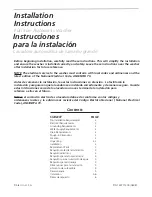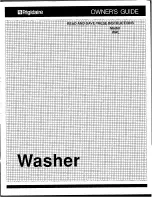
18
installation
NOTICE
• There should be no more than 6500 BTU per square inch of flue.
(Refer to illustration below for the following:)
4. Following the gas line from the meter or regulator, before the machine,
install a manual main shut-off valve.
5. Down stream from the main shut-off valve, a tee and drip leg should be
installed to catch debris and moisture. This leg must be capped.
6. A 4” nipple and gas regulator should be installed off of the tee. This
regulator should control gas pressure down to 3”-12” W.C.P.
7. On the other side of the regulator, another 4” nipple and union should
be installed.
8. After the union and before the gas valve on the unit, a manual shut-off
valve should be installed with a 1/8” NPT plugged tapping accessible
for test gauge connection between it and the union.
Operator's Manual
3
installation
1. Installation of this unit should be performed by a qualified serviceman
and all gas piping must conform to all local, state and national codes,
including the National Fuel Gas Code ANSI Z223./NFPA No. 54. In
Canada; Refer to the CSA B49. Gas Installation Code.
2. Turn off gas and electricity before starting installation or service.
3. The gas line to the burner should be a separate supply from the meter
because of the burner demand. Use new pipe and locate it with future
service in mind. Use only black pipe or tubing suitable for gas applications
and make sure the pipe is free from cutting burrs and defects. Use joint
compound (not teflon tape) only on male fittings, leaving clean the first
two threads to be engaged. DO NOT use compound on female threads
where it can be pushed into the line and cause gas valve failure.
recommended pipe siZes for gas supply line
(Refer to illustration # for the following:)
4. Following the gas line from the meter or regulator, before the machine,
install a manual main shut-off valve.
5. Down stream from the main shut-off valve, a tee and drip leg should be
installed to catch debris and moisture. This leg must be capped.
6. A 4" nipple and gas regulator should be installed off of the tee. This
regulator should control gas pressure down to 3"-2" W.C.P.
7. On the other side of the regulator, another 4" nipple and union should
be installed.
8. After the union and before the gas valve on the unit, a manual shut-off
valve should be installed with a /8" NPT plugged tapping accessible for
test gauge connection between it and the union.
gas piping:
illustration #1
gas supply piping
NATURAL GAS
L.P.-GAS
DISTANCE TO UNIT
FROM REGULATOR
PIPE SIZE
DISTANCE TO UNIT
FROM REGULATOR
PIPE SIZE
0-50 Feet
-/2" PS
0-50 Feet
" PS
50-00 Feet
2" PS
50-00 Feet
-/2" PS
00-200 Feet
2-/2" PS
00-200 Feet
-3/4" PS
VENTIlATION
1. Installation of this unit in an indoor or in an enclosed area should be
performed by a qualified serviceman and all venting must conform to all
local, state and national codes, including the National Fuel Gas Code
ANSI Z223.1/NFPA No. 54. In Canada; Refer to the CSA B149.1 Gas
Installation Code. The burner exhaust should be stacked to the outside
atmosphere and a draft diverter should be installed as well.
2. A draft diverter must be installed above the exhaust outlet. This diverter
breaks the chimney effect and enhances the draft through the burner
for a more efficient flame. It also helps prevent cold air downdrafts from
freezing the heat exchanger.
















































